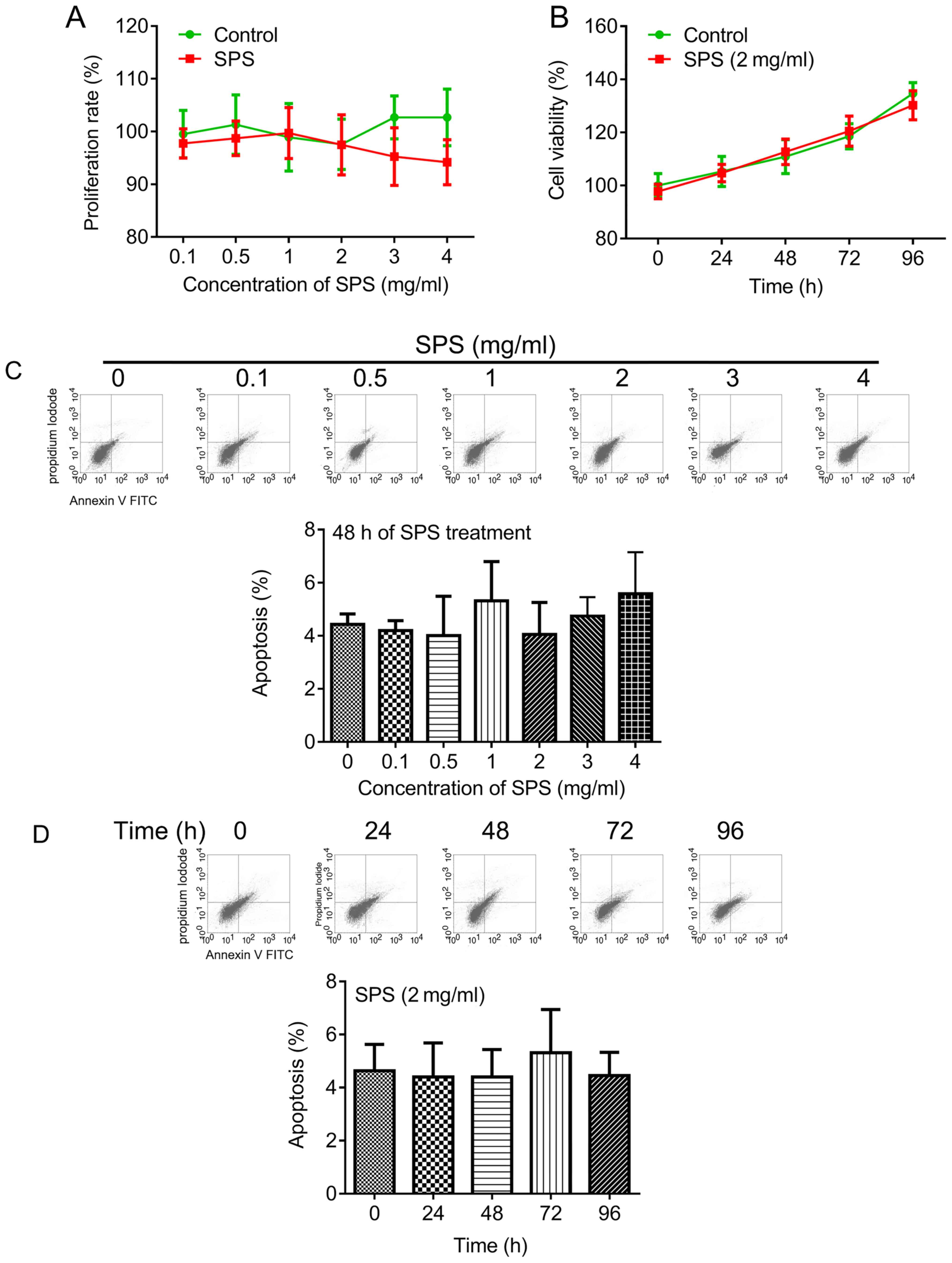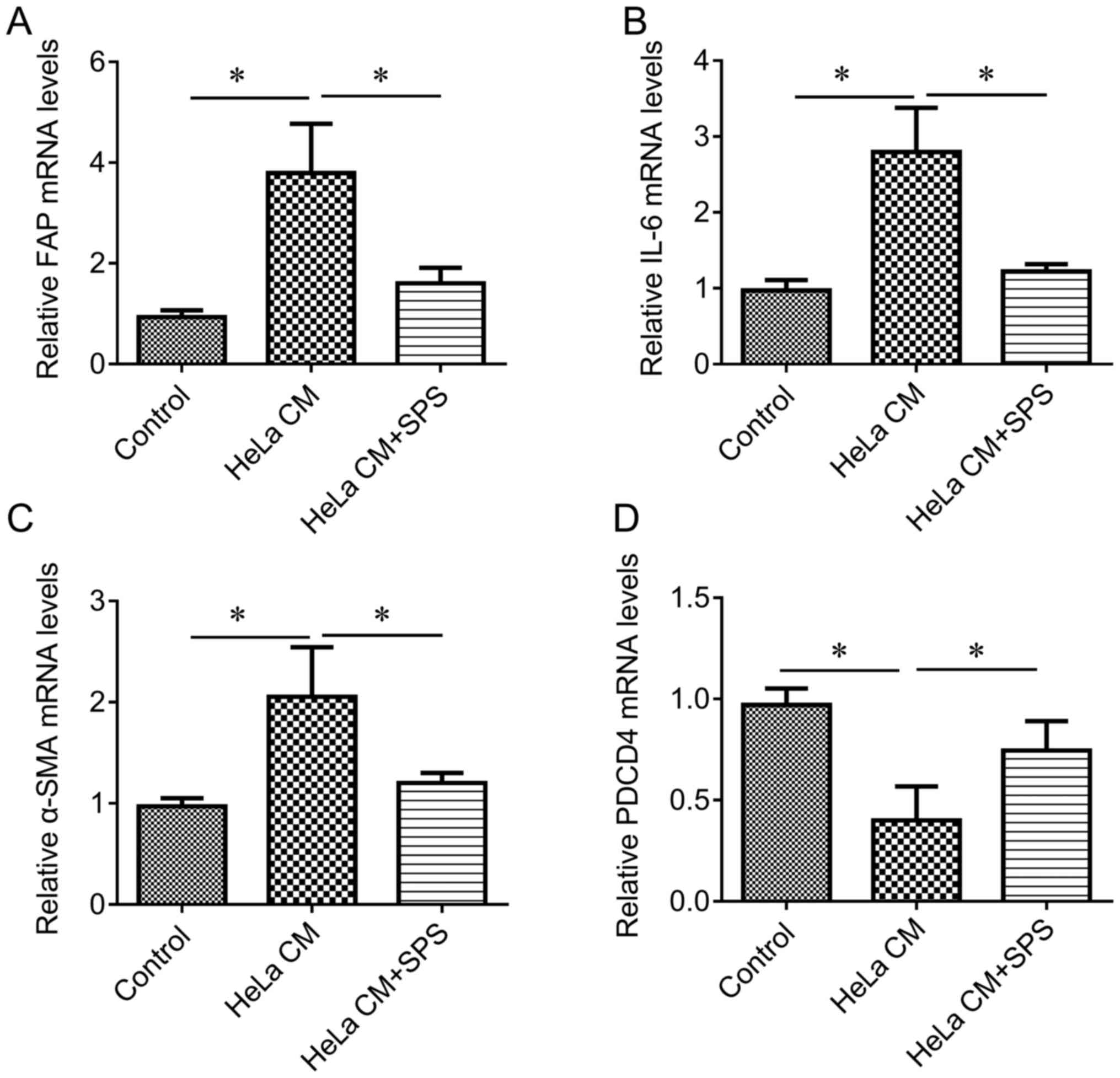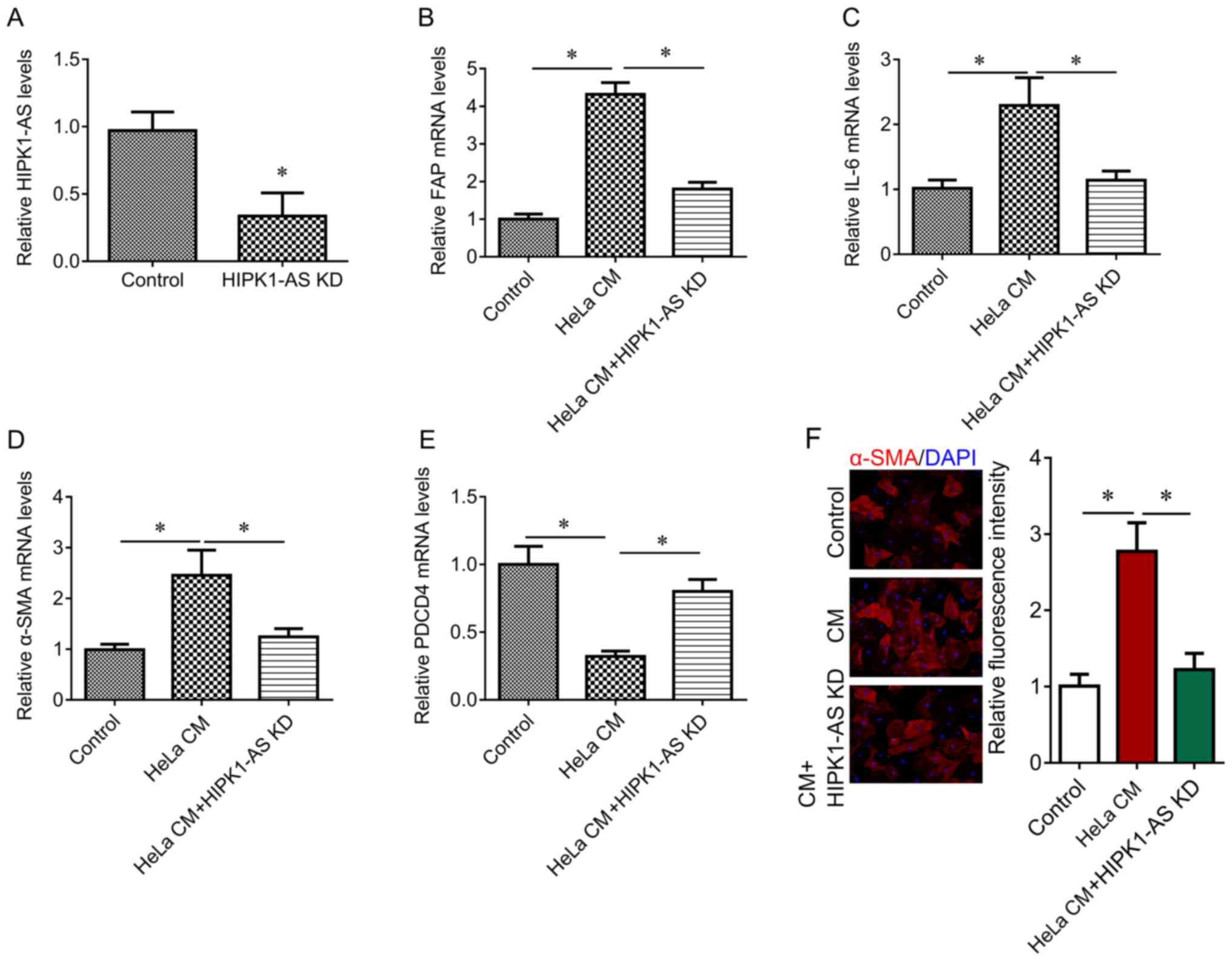|
1
|
Senba M and Mori N: Mechanisms of virus
immune evasion lead to development from chronic inflammation to
cancer formation associated with human papillomavirus infection.
Oncol Rev. 6:e172012. View Article : Google Scholar : PubMed/NCBI
|
|
2
|
Pandey S and Chandravati: Autophagy in
cervical cancer: An emerging therapeutic target. Asian Pac J Cancer
Prev. 13:4867–4871. 2012. View Article : Google Scholar : PubMed/NCBI
|
|
3
|
Ma D, Chang LY, Zhao S, Zhao JJ, Xiong YJ,
Cao FY, Yuan L, Zhang Q, Wang XY, Geng ML, et al: KLF5 promotes
cervical cancer proliferation, migration and invasion in a manner
partly dependent on TNFRSF11a expression. Sci Rep. 7:156832017.
View Article : Google Scholar : PubMed/NCBI
|
|
4
|
Walch-Rückheim B, Mavrova R, Henning M,
Vicinus B, Kim YJ, Bohle RM, Juhasz-Böss I, Solomayer EF and Smola
S: Stromal fibroblasts induce CCL20 through IL6/C/EBPβ to support
the recruitment of Th17 cells during cervical cancer progression.
Cancer Res. 75:5248–5259. 2015. View Article : Google Scholar : PubMed/NCBI
|
|
5
|
Erez N, Truitt M, Olson P, Arron ST and
Hanahan D: Cancer-associated fibroblasts are activated in incipient
neoplasia to orchestrate tumor-promoting inflammation in an
NF-kappaB-dependent manner. Cancer Cell. 17:135–147. 2010.
View Article : Google Scholar : PubMed/NCBI
|
|
6
|
Zhang D, Ding L, Li Y, Ren J, Shi G, Wang
Y, Zhao S, Ni Y and Hou Y: Midkine derived from cancer-associated
fibroblasts promotes cisplatin-resistance via up-regulation of the
expression of lncRNA ANRIL in tumour cells. Sci Rep. 7:162312017.
View Article : Google Scholar : PubMed/NCBI
|
|
7
|
Vafaee F, Colvin EK, Mok SC, Howell VM and
Samimi G: Functional prediction of long non-coding RNAs in ovarian
cancer-associated fibroblasts indicate a potential role in
metastasis. Sci Rep. 7:103742017. View Article : Google Scholar : PubMed/NCBI
|
|
8
|
Zhao L, Ji G, Le X, Wang C, Xu L, Feng M,
Zhang Y, Yang H, Xuan Y, Yang Y, et al: Long noncoding RNA
LINC00092 acts in cancer-associated fibroblasts to drive glycolysis
and progression of ovarian cancer. Cancer Res. 77:1369–1382. 2017.
View Article : Google Scholar : PubMed/NCBI
|
|
9
|
Yimam M, Lee YC, Wright L, Jiao P, Horm T,
Hong M, Brownell L and Jia Q: A botanical composition mitigates
cartilage degradations and pain sensitivity in osteoarthritis
disease model. J Med Food. 20:568–576. 2017. View Article : Google Scholar : PubMed/NCBI
|
|
10
|
He X, Bai Y, Zhao Z, Wang X, Fang J, Huang
L, Zeng M, Zhang Q, Zhang Y and Zheng X: Local and traditional
uses, phytochemistry, and pharmacology of Sophora japonica
L.: A review. J Ethnopharmacol. 187:160–182. 2016. View Article : Google Scholar : PubMed/NCBI
|
|
11
|
Ren Y, Qiao W, Fu D, Han Z, Liu W, Ye W
and Liu Z: Traditional Chinese medicine protects against cytokine
production as the potential immunosuppressive agents in
atherosclerosis. J Immunol Res. 2017:74243072017. View Article : Google Scholar : PubMed/NCBI
|
|
12
|
Oliveira AM, Nascimento MF, Ferreira MR,
Moura DF, Souza TG, Silva GC, Ramos EH, Paiva PM, Medeiros PL,
Silva TG, et al: Evaluation of acute toxicity, genotoxicity and
inhibitory effect on acute inflammation of an ethanol extract of
Morus alba L. (Moraceae) in mice. J Ethnopharmacol.
194:162–168. 2016. View Article : Google Scholar : PubMed/NCBI
|
|
13
|
Kurman RJ, Carcangiu ML, Herrington CS and
Young RH: WHO Classification of Tumours of Female Reproductive
Organs (Fourth edition). WHO Press; 2014
|
|
14
|
Livak KJ and Schmittgen TD: Analysis of
relative gene expression data using real-time quantitative PCR and
the 2(-Delta Delta C(T)) method. Methods. 25:402–408. 2001.
View Article : Google Scholar : PubMed/NCBI
|
|
15
|
Wang T, Miao M, Bai M, Li Y, Li M, Li C
and Xu Y: Effect of sophora japonica total flavonoids on pancreas,
kidney tissue morphology of streptozotocin-induced diabetic mice
model. Saudi J Biol Sci. 24:741–747. 2017. View Article : Google Scholar : PubMed/NCBI
|
|
16
|
Yu JS, Lee D, Lee SR, Lee JW, Choi CI,
Jang TS, Kang KS and Kim KH: Chemical characterization of cytotoxic
indole acetic acid derivative from mulberry fruit (Morus
alba L.) against human cervical cancer. Bioorg Chem. 76:28–36.
2017. View Article : Google Scholar : PubMed/NCBI
|
|
17
|
Dong XQ, Du Q, Yu WH, Zhang ZY, Zhu Q, Che
ZH, Chen F, Wang H and Chen J: Anti-inflammatory effects of
oxymatrine through inhibition of nuclear factor-kappa B and
mitogen-activated protein kinase activation in
Lipopolysaccharide-induced BV2 microglia cells. Iran J Pharm Res.
12:165–174. 2013.PubMed/NCBI
|
|
18
|
Zhang M, Wang X, Wang X, Hou X, Teng P,
Jiang Y, Zhang L, Yang X, Tian J, Li G, et al: Oxymatrine protects
against myocardial injury via inhibition of JAK2/STAT3 signaling in
rat septic shock. Mol Med Rep. 7:1293–1299. 2013. View Article : Google Scholar : PubMed/NCBI
|
|
19
|
Kim BH, Chung EY, Ryu JC, Jung SH, Min KR
and Kim Y: Anti-inflammatory mode of isoflavone glycoside
sophoricoside by inhibition of interleukin-6 and cyclooxygenase-2
in inflammatory response. Arch Pharm Res. 26:306–311. 2003.
View Article : Google Scholar : PubMed/NCBI
|
|
20
|
Kalman DS and Hewlings SJ: The effects of
Morus alba and Acacia catechu on quality of life and overall
function in adults with osteoarthritis of the knee. J Nutr Metab.
2017:48931042017. View Article : Google Scholar : PubMed/NCBI
|
|
21
|
Vochyánová Z, Pokorná M, Rotrekl D, Smékal
V, Fictum P, Suchý P, Gajdziok J, Šmejkal K and Hošek J: Prenylated
flavonoid morusin protects against TNBS-induced colitis in rats.
PLoS One. 12:e1824642017. View Article : Google Scholar
|
|
22
|
Fagerberg L, Hallström BM, Oksvold P,
Kampf C, Djureinovic D, Odeberg J, Habuka M, Tahmasebpoor S,
Danielsson A, Edlund K, et al: Analysis of the human
tissue-specific expression by genome-wide integration of
transcriptomics and antibody-based proteomics. Mol Cell Proteomics.
13:397–406. 2014. View Article : Google Scholar : PubMed/NCBI
|
|
23
|
Soibam B: Super-lncRNAs: Identification of
lncRNAs that target super-enhancers via RNA:DNA:DNA triplex
formation. RNA. 23:1729–1742. 2017. View Article : Google Scholar : PubMed/NCBI
|
|
24
|
Rey C, Soubeyran I, Mahouche I, Pedeboscq
S, Bessede A, Ichas F, De Giorgi F and Lartigue L: HIPK1 drives p53
activation to limit colorectal cancer cell growth. Cell Cycle.
12:1879–1891. 2013. View
Article : Google Scholar : PubMed/NCBI
|
|
25
|
Lee D, Park SJ, Sung KS, Park J, Lee SB,
Park SY, Lee HJ, Ahn JW, Choi SJ, Lee SG, et al: Mdm2 associates
with Ras effector NORE1 to induce the degradation of oncoprotein
HIPK1. EMBO Rep. 13:163–169. 2012. View Article : Google Scholar : PubMed/NCBI
|
|
26
|
Ohnheiser J, Ferlemann E, Haas A, Muller
JP, Werwein E, Fehler O, Biyanee A and Klempnauer KH: Programmed
cell death 4 protein (Pdcd4) and homeodomain-interacting protein
kinase 2 (Hipk2) antagonistically control translation of Hipk2
mRNA. Biochim Biophys Acta. 1853:1564–1573. 2015. View Article : Google Scholar : PubMed/NCBI
|
|
27
|
Yao Q, Cao S, Li C, Mengesha A, Kong B and
Wei M: Micro-RNA-21 regulates TGF-β-induced myofibroblast
differentiation by targeting PDCD4 in tumor-stroma interaction. Int
J Cancer. 128:1783–1792. 2011. View Article : Google Scholar : PubMed/NCBI
|
|
28
|
Kinoshita H, Hirata Y, Nakagawa H,
Sakamoto K, Hayakawa Y, Takahashi R, Nakata W, Sakitani K, Serizawa
T, Hikiba Y, et al: Interleukin-6 mediates epithelial-stromal
interactions and promotes gastric tumorigenesis. PLoS One.
8:e609142013. View Article : Google Scholar : PubMed/NCBI
|
|
29
|
Orimo A, Gupta PB, Sgroi DC,
Arenzana-Seisdedos F, Delaunay T, Naeem R, Carey VJ, Richardson AL
and Weinberg RA: Stromal fibroblasts present in invasive human
breast carcinomas promote tumor growth and angiogenesis through
elevated SDF-1/CXCL12 secretion. Cell. 121:335–348. 2005.
View Article : Google Scholar : PubMed/NCBI
|
|
30
|
Ren C, Cheng X, Lu B and Yang G:
Activation of interleukin-6/signal transducer and activator of
transcription 3 by human papillomavirus early proteins 6 induces
fibroblast senescence to promote cervical tumourigenesis through
autocrine and paracrine pathways in tumour microenvironment. Eur J
Cancer. 49:3889–3899. 2013. View Article : Google Scholar : PubMed/NCBI
|


















